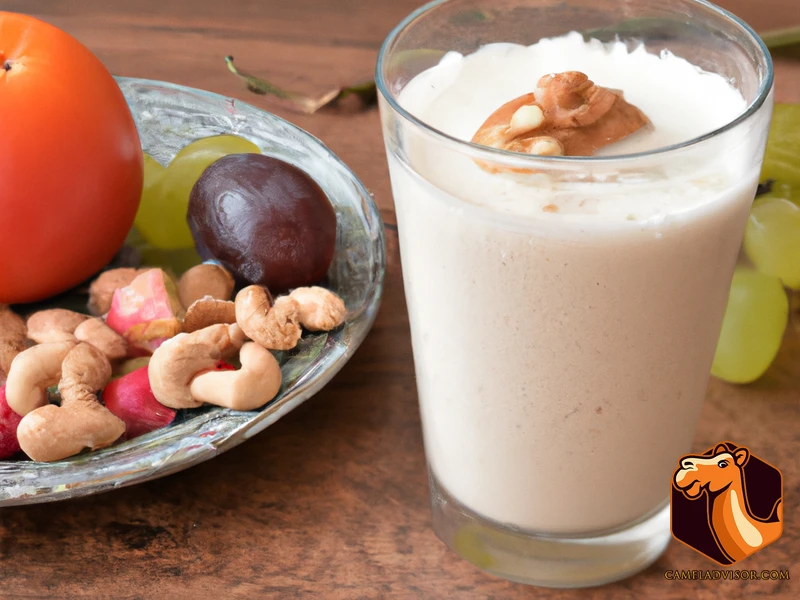The world of nutrition never ceases to surprise us with its myriad of options. From time to time, a new food fad crops up to claim its place under the sun. And now, it’s the turn of camel milk to take center stage. Yes, this ancient traditional drink of nomadic cultures is being touted as a superfood with a host of health benefits. One of the most significant benefits of camel milk is its positive impact on gut health. The gut is where most of the body’s vital functions take place, and its health is critical to overall well-being. In this article, we delve into the world of camel milk and explore its relationship with gut health.
Contents
- Gut Health and Digestion
- Camel Milk for Gut Health
- How to Incorporate Camel Milk into Your Diet
- Conclusion
-
Frequently Asked Questions
- What is camel milk?
- What are the nutritional benefits of camel milk?
- Is camel milk safe for people with lactose intolerance?
- How does camel milk impact gut health?
- Are there any studies on the effects of camel milk on gut health?
- Where can I buy camel milk?
- What products can be made from camel milk?
- What recipes can I make with camel milk?
- Are there any safety considerations when consuming camel milk?
- Is it ethical to consume camel milk?
- References
Gut Health and Digestion

Good gut health is essential for overall well-being. Your gut plays a significant role in digestion, and a healthy gut ensures that nutrients are properly absorbed by the body. Digestive issues such as bloating, constipation, and diarrhea can affect your quality of life. However, gut health is not just about digestion. Did you know that more than 70% of your immune system is located in your gut? Not only that, but your gut also hosts trillions of bacteria that are crucial for your health. This is where the term gut microbiome comes in. The balance and diversity of these bacteria contribute to maintaining good gut health. In the following sections, we will explore how camel milk can support gut health and digestion.
The Role of Gut Microbiome
The gut microbiome is a complex ecosystem of microorganisms that resides in the gastrointestinal tract. This microbial population consists of a diverse range of bacteria, fungi, viruses, and other microorganisms. The microbiome plays a crucial role in maintaining overall health by aiding digestion, producing essential vitamins, and regulating the immune system.
One of the critical roles of gut microbiome is to aid in digestion. It is responsible for breaking down complex carbohydrates, proteins and fats into smaller, more manageable molecules, including short-chain fatty acids. These short-chain fatty acids are essential for providing energy to the cells lining the gut.
The gut microbiome also has a role in regulating immune function. It helps to stimulate the immune system and maintain a balance between harmful and beneficial bacteria. However, when this balance is disrupted, and harmful bacteria outweigh the beneficial ones, it can lead to various health problems.
Studies suggest that gut dysbiosis or an imbalance in the gut microbiome may lead to an increased risk of developing digestive issues, such as leaky gut, irritable bowel syndrome, inflammatory bowel disease and even colon cancer. It can also lead to systemic diseases such as type 2 diabetes, obesity, and cardiovascular disease.
- Leaky gut is a condition where the lining of the intestine becomes permeable, allowing harmful bacteria to enter the bloodstream.
- Irritable bowel syndrome (IBS) is characterized by symptoms like abdominal pain, bloating, and diarrhea or constipation.
- Inflammatory bowel disease (IBD) is a chronic inflammation of the digestive tract, which includes Crohn’s disease and ulcerative colitis.
- Colon cancer is a cancer of the large intestine, which can develop due to prolonged inflammation and damage to the intestinal lining.
Maintaining a healthy gut microbiome is critical for our overall health and well-being. Consuming foods that help promote a healthy gut microbiome, like camel milk, can help improve digestive health, strengthen the immune system, and reduce the risk of developing various digestive and systemic diseases. It is, therefore, essential to consider incorporating camel milk into your diet. To learn more about the health benefits of camel milk, check out Camel Milk vs Cow Milk: Which is Healthier? and The Nutritional Value of Camel Milk.
Gut Dysbiosis and Digestive Issues
Gut dysbiosis refers to an imbalance in the gut microbiome, which can lead to a variety of digestive issues such as constipation, diarrhea, bloating, and abdominal pain. This can occur due to a multitude of factors such as diet, antibiotic use, and chronic stress.
When the gut microbiome is out of balance, harmful bacteria can overgrow and cause inflammation in the gut lining. This inflammation can lead to a weakened gut lining, which can allow harmful substances to leak from the gut into the bloodstream, potentially causing systemic inflammation and contributing to various health issues throughout the body.
Research has linked gut dysbiosis to various health conditions such as:
| Condition | Description |
| Obesity | Studies have found a correlation between gut dysbiosis and increased body weight, specifically an increase in the bacteria Firmicutes and a decrease in Bacteroidetes. |
| Type 2 diabetes | Gut dysbiosis has been linked to insulin resistance and the development of type 2 diabetes. |
| Inflammatory bowel disease (IBD) | Gut dysbiosis is believed to play a role in the development of IBD, which includes conditions such as Crohn’s disease and ulcerative colitis. |
| Autoimmune diseases | Research has found links between gut dysbiosis and autoimmune diseases such as rheumatoid arthritis and multiple sclerosis. |
It is important to maintain a healthy gut microbiome to prevent these health issues. Incorporating foods that promote a healthy gut, such as camel milk, into your diet can be beneficial.
Camel milk contains proteins that have been shown to have antibacterial properties, which can help to restore a healthy balance of gut bacteria. Additionally, the anti-inflammatory properties of camel milk can help to reduce inflammation in the gut lining and promote healing.
Camel Milk for Gut Health
Looking for natural remedies for gut health? You might want to try camel milk. Camel milk has been recognized for its health benefits for centuries, particularly in the desert regions of Asia and Africa. While it is typically consumed for its high nutrient content and delicious taste, recent studies have shown that camel milk also has antibacterial and anti-inflammatory properties that can promote gut health. In this section, we will explore the nutritional value of camel milk, its potential benefits for gut health, and how you can incorporate this superfood into your diet.
Nutritional Value of Camel Milk
Camel milk has been a staple in many cultures for centuries, known for its numerous health benefits. It has been gaining popularity in recent times due to its potential to improve gut health. Nutritionally, camel milk is superior to other mammal milk due to its unique profile.
Here are some nutritional facts about camel milk:
- Rich in nutrients: Camel milk is an excellent source of nutrients, including vitamins B1, B2, and C, as well as minerals such as calcium, potassium, and iron.
- Low in fat: Camel milk has a lower fat content than other milk varieties, making it a great option for those watching their fat intake.
- High in protein: Camel milk contains more protein than cow’s milk. The protein in camel milk is also easier to digest and absorb by the body, making it a great option for those with lactose intolerance.
- Contains immunoglobulins: Camel milk is a good source of immunoglobulins, which are antibodies that help fight against diseases and infections.
- Higher in Vitamin C: Camel milk has three times more vitamin C than cow’s milk. This essential antioxidant helps to protect against cellular damage and helps the immune system function properly.
The composition of camel milk makes it a great option for individuals who are looking for an alternative to traditional cow’s milk. With its high protein content, lower fat content, and numerous vitamins and minerals, camel milk offers the perfect balance of nutrition and taste.
Studies have shown that camel milk is beneficial for managing diabetes, improving immune health, promoting good skin health and combating diseases. Click here to learn more about camel milk’s benefits for managing diabetes, or here to learn more about camel milk’s immune-boosting properties or here for its benefits on skin health.
Antibacterial and Anti-Inflammatory Properties
Camel milk has been found to have antibacterial and anti-inflammatory properties, which can contribute to improved gut health. These properties can be attributed to various components present in camel milk such as lactoferrin, lysozyme, and immunoglobulins.
Lactoferrin, for instance, is a protein in camel milk that exhibits antibacterial activity against various pathogenic microorganisms. It binds to iron, which is essential for bacterial growth, and thus inhibits their growth and proliferation. Lysozyme is another protein that has antibacterial properties and is found in camel milk. It can disrupt the bacterial cell wall, causing the bacteria to die.
In addition to its antibacterial properties, camel milk also has anti-inflammatory properties. Inflammation is a defense mechanism of the body in response to infection or injury, but excessive inflammation can cause tissue damage and chronic diseases. Camel milk contains immunoglobulins that can reduce inflammation by neutralizing pro-inflammatory molecules called cytokines.
Studies have shown that consuming camel milk can reduce inflammation in the gut and improve gut health. A study published in the Journal of Dairy Research found that camel milk can reduce inflammation in the colon of rats with induced colitis. Another study published in the Journal of Medicinal Food found that camel milk can improve gut health in children with autism spectrum disorder.
Incorporating camel milk into your diet can help improve your gut health due to its antibacterial and anti-inflammatory properties. You can try camel milk as a substitute for cow’s milk in your favorite recipes or as a standalone drink. Camel milk is also available in various forms such as cheese, yogurt, and ice cream. However, it is important to note that camel milk can cause allergic reactions in some people, especially those allergic to cow’s milk.
The antibacterial and anti-inflammatory properties of camel milk make it a promising food for improving gut health. Regular consumption of camel milk, in combination with a healthy diet and lifestyle, can help prevent and manage digestive issues. To learn more about the health benefits of camel milk, check out our article on Camel Milk and Fighting Diseases or our article on Camel Milk and Calcium for Health.
Studies on Camel Milk’s Effects on Gut Health
Studies have shown that camel milk can have a positive effect on gut health. Here are some of the findings:
- Improved gut microbiome: One study found that consuming camel milk led to an improvement in the diversity of gut microorganisms, which can help support overall digestive health.
- Reduced inflammation: A study on rats with colitis found that camel milk helped reduce inflammation in the gut. The rats that consumed camel milk also had less damage to their colons compared to the control group.
- Relief from diarrhea: Another study found that children with diarrhea who consumed camel milk had a quicker recovery time compared to those who received a standard electrolyte solution.
- Alleviation of constipation: A study on elderly individuals found that consuming camel milk for two weeks led to an improvement in bowel movements and a reduction in constipation.
- Improved digestion of lactose: Camel milk contains a different type of lactose than cow’s milk, which may make it easier for some lactose-intolerant individuals to digest. One study found that participants who were lactose intolerant were able to tolerate moderate amounts of camel milk without experiencing digestive issues.
These studies suggest that adding camel milk to your diet may help support overall gut health and alleviate digestive discomfort. However, it is important to keep in mind that more research is needed to fully understand the effects of camel milk on gut health.
How to Incorporate Camel Milk into Your Diet
Now that you have learned about the beneficial properties of camel milk for gut health, you may be wondering how to incorporate it into your diet. Luckily, there are a variety of ways to enjoy this nutritious and unique dairy product. In this section, we will explore different camel milk products available on the market, recipes that incorporate camel milk, and safety considerations to keep in mind when consuming camel milk. Whether you are lactose intolerant or just looking to explore new and healthy foods, camel milk may be a great addition to your diet.
Camel Milk Products
When it comes to incorporating camel milk into your diet, there are several camel milk products to choose from. These products are widely available in Middle Eastern countries, but they can also be found in specialty stores and online.
Camel Milk Powder: Camel milk powder is a convenient way to enjoy camel milk without refrigeration. It can be used in cooking or to make a quick and easy drink by reconstituting it with water.
Camel Milk Cheese: Camel milk cheese is a popular product in the Middle East, with several variations available. Some types are soft and creamy, while others are aged and have a stronger flavor.
Camel Milk Yogurt: Like traditional yogurt, camel milk yogurt is made by fermenting camel milk with live cultures. It has a slightly tangy taste and can be enjoyed plain or with added fruit and honey.
Camel Milk Ice Cream: For a sweet treat, camel milk ice cream is a delicious option. It can be found in several flavors, including chocolate and vanilla.
Camel Milk Soap: In addition to food products, camel milk is also used in skincare. Camel milk soap is moisturizing and gentle on the skin, making it a popular choice for those with sensitive skin.
Camel Milk Powder: | Camel Milk Cheese: | Camel Milk Yogurt: | Camel Milk Ice Cream: | Camel Milk Soap:
Convenient to use | Popular in Middle East | Tangy taste | Delicious dessert | Moisturizing
Used in cooking | Soft or aged variations | Can be flavored | Available in different flavors | Gentle on skin
No refrigeration needed | Strong flavor | Live cultures | Sweet treat | Sensitive-skin friendly
Widely available | Several types available | Versatile | Popular option |
Can be found online | | | |
Recipes with Camel Milk
There are many ways to incorporate camel milk into your diet, including using it in recipes. Here are a few ideas:
- Smoothies: Add camel milk to your favorite smoothie recipe. It pairs well with fruits like bananas, mangoes, and berries.
- Oatmeal: Use camel milk instead of regular milk or water to cook your oatmeal. It adds a creamy texture and a subtle sweetness.
- Coffee: Replace your regular milk or creamer with camel milk for a unique twist on your morning coffee.
- Cheese: Use camel milk to make cheese. It has a higher fat content than cow’s milk, which makes for a richer cheese.
- Custard: Make a camel milk custard by substituting camel milk for regular milk in your recipe.
- Ice Cream: Use camel milk to make ice cream. It has a creamier consistency than cow’s milk, which makes for a smoother ice cream.
- Pudding: Use camel milk to make pudding. It adds a unique flavor to this classic dessert.
When using camel milk in recipes, it’s important to keep in mind that it has a slightly different flavor than cow’s milk. Some people have described it as slightly saltier or nuttier. However, it’s a versatile ingredient that can be used in a variety of recipes. Just be sure to refrigerate it properly and use it within its expiration date.
Safety Considerations
When it comes to adding camel milk to your diet, there are a few safety considerations that should be kept in mind in order to avoid any negative consequences. Some of the important things to keep in mind include:
- Lactose Intolerance: While camel milk is lower in lactose than cow’s milk, it still contains lactose. Individuals who are lactose intolerant or have a sensitivity to lactose should be cautious when consuming camel milk and may want to start with small amounts to see how their body reacts.
- Allergies: Camel milk allergies are rare but can occur in some individuals. Symptoms of a camel milk allergy may include hives, swelling, and difficulty breathing. If you have never consumed camel milk before, it is a good idea to start with a small amount and monitor your body for any adverse reactions.
- Source: It is important to ensure that the camel milk you consume comes from a reliable source. Contaminated milk can lead to illness, so it is important to buy from a reputable producer or supplier.
- Storage: Proper storage is essential in maintaining the freshness and safety of camel milk. Camel milk should be stored in a clean and cooled environment, and it is recommended to consume within three days after opening.
- Pregnancy: It is not clear whether camel milk is safe for pregnant women. It is important for pregnant women to speak with their healthcare provider before including camel milk in their diet.
By keeping these safety considerations in mind, individuals can add camel milk to their diet in a safe and healthy way.
Conclusion
After reviewing the research on camel milk and gut health, it’s evident that incorporating camel milk into your diet can provide numerous benefits for gut health.
The Role of Camel Milk: Camel milk has antibacterial and anti-inflammatory properties, making it a valuable addition to a gut-healthy diet.
Nutritional Value: Additionally, camel milk is a rich source of nutrients like calcium, potassium, and vitamins C and B, making it an overall beneficial beverage to include in your daily intake.
Gut Dysbiosis and Digestive Issues: For those with digestive issues stemming from gut dysbiosis, there is evidence that camel milk can improve symptoms like bloating, gas, and constipation, making it an excellent option for those who suffer from irritable bowel syndrome or other digestive disorders.
How to Incorporate Camel Milk: If you’re interested in trying camel milk, there are many ways to incorporate it into your diet. You can find camel milk products in most health food stores, or make your own using camel milk powder. There are also many delicious recipes available that incorporate camel milk as an ingredient, such as smoothies, lattes, and desserts.
Safety Considerations: While camel milk consumption is generally considered safe for most people, it is important to ensure that it is properly pasteurized to reduce the risk of bacterial contamination. Additionally, if you have a milk allergy, it is essential to speak to your healthcare provider before incorporating camel milk into your diet.
Overall, the research shows that camel milk can be a valuable addition to a healthy gut diet. Whether you’re looking to improve digestive symptoms or simply trying to incorporate more nutrient-dense foods into your diet, camel milk is definitely worth considering.
Frequently Asked Questions
What is camel milk?
Camel milk is a type of milk that comes from camels and is traditionally consumed in various parts of the world, particularly in the Middle East, Africa, and Asia.
What are the nutritional benefits of camel milk?
Camel milk is a rich source of nutrients such as protein, calcium, potassium, magnesium, and vitamin C. It also contains lower levels of fat than cow’s milk and is high in unsaturated fatty acids.
Is camel milk safe for people with lactose intolerance?
Camel milk is generally considered to be suitable for people with lactose intolerance as it contains lower levels of lactose than cow’s milk. However, individuals with severe lactose intolerance should still exercise caution.
How does camel milk impact gut health?
Camel milk has antibacterial and anti-inflammatory properties which may promote a healthy gut microbiome and alleviate digestive issues such as diarrhea, constipation, and bloating.
Are there any studies on the effects of camel milk on gut health?
Yes, several studies have been conducted that suggest camel milk may have positive effects on gut health, including reducing inflammation and balancing gut bacteria.
Where can I buy camel milk?
Camel milk can often be found in specialty food stores, health food stores, or online. It may also be available at local farmers markets or through dairy farms.
What products can be made from camel milk?
Camel milk can be used to make a variety of dairy products, including cheese, yogurt, and ice cream. It can also be consumed as a standalone beverage.
What recipes can I make with camel milk?
Camel milk can be used in recipes that call for regular milk, such as smoothies, baked goods, and sauces. It can also be used in traditional desserts such as Arabic-style rice pudding.
Are there any safety considerations when consuming camel milk?
Camel milk should be treated the same as any other milk product when it comes to food safety. It should be kept refrigerated and consumed before the expiration date. Additionally, individuals with a history of allergies to milk or dairy products should exercise caution when consuming camel milk.
Is it ethical to consume camel milk?
There is ongoing debate about the ethics of consuming camel milk. Some argue that camels are better adapted to harsh environments than cows, and their milk production may be more sustainable. However, it is important to consider the treatment of the animals and their welfare when producing camel milk.







